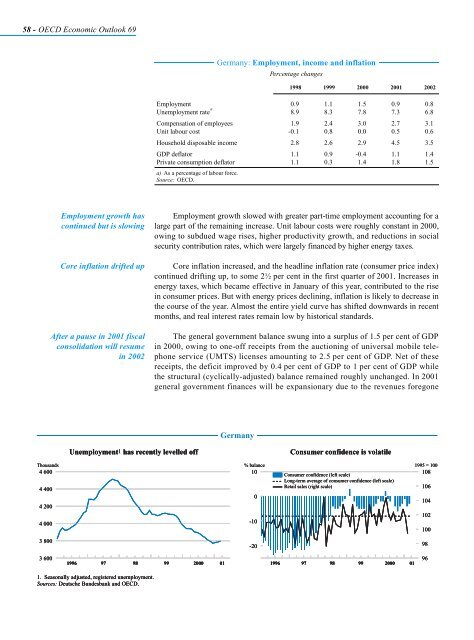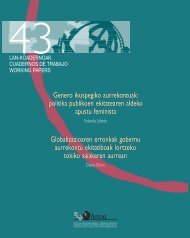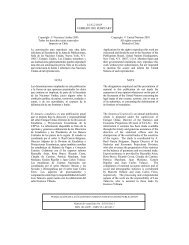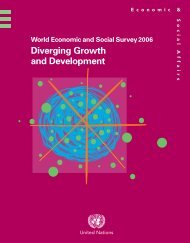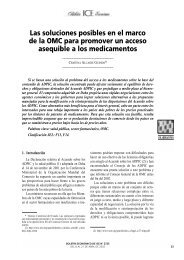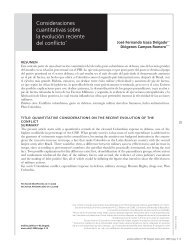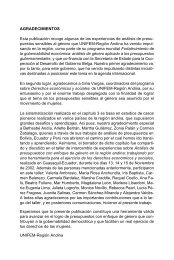OECD Economic Outlook 69 - Biblioteca Hegoa
OECD Economic Outlook 69 - Biblioteca Hegoa
OECD Economic Outlook 69 - Biblioteca Hegoa
Create successful ePaper yourself
Turn your PDF publications into a flip-book with our unique Google optimized e-Paper software.
58 - <strong>OECD</strong> <strong>Economic</strong> <strong>Outlook</strong> <strong>69</strong><br />
Employment growth has<br />
continued but is slowing<br />
Employment growth slowed with greater part-time employment accounting for a<br />
large part of the remaining increase. Unit labour costs were roughly constant in 2000,<br />
owing to subdued wage rises, higher productivity growth, and reductions in social<br />
security contribution rates, which were largely financed by higher energy taxes.<br />
Core inflation drifted up Core inflation increased, and the headline inflation rate (consumer price index)<br />
continued drifting up, to some 2½ per cent in the first quarter of 2001. Increases in<br />
energy taxes, which became effective in January of this year, contributed to the rise<br />
in consumer prices. But with energy prices declining, inflation is likely to decrease in<br />
the course of the year. Almost the entire yield curve has shifted downwards in recent<br />
months, and real interest rates remain low by historical standards.<br />
After a pause in 2001 fiscal<br />
consolidation will resume<br />
in 2002<br />
Thousands % balance<br />
4 600<br />
10<br />
4 400<br />
4 200<br />
4 000<br />
3 800<br />
3 600<br />
Germany: Employment, income and inflation<br />
Percentage changes<br />
1998 1999 2000 2001 2002<br />
Employment<br />
a<br />
Unemployment rate<br />
0.9<br />
8.9<br />
1.1<br />
8.3<br />
1.5<br />
7.8<br />
0.9<br />
7.3<br />
0.8<br />
6.8<br />
Compensation of employees 1.9 2.4 3.0 2.7 3.1<br />
Unit labour cost -0.1 0.8 0.0 0.5 0.6<br />
Household disposable income 2.8 2.6 2.9 4.5 3.5<br />
GDP deflator 1.1 0.9 -0.4 1.1 1.4<br />
Private consumption deflator<br />
a) As a percentage of labour force.<br />
Source: <strong>OECD</strong>.<br />
1.1 0.3 1.4 1.8 1.5<br />
The general government balance swung into a surplus of 1.5 per cent of GDP<br />
in 2000, owing to one-off receipts from the auctioning of universal mobile telephone<br />
service (UMTS) licenses amounting to 2.5 per cent of GDP. Net of these<br />
receipts, the deficit improved by 0.4 per cent of GDP to 1 per cent of GDP while<br />
the structural (cyclically-adjusted) balance remained roughly unchanged. In 2001<br />
general government finances will be expansionary due to the revenues foregone<br />
Unemployment1 Unemployment1 Unemployment1 has recently levelled off Consumer confidence is volatile<br />
1996 97 98 99 2000 01 1996 97 98 99 2000 01<br />
1. Seasonally adjusted, registered unemployment.<br />
Sources: Deutsche Bundesbank and <strong>OECD</strong>.<br />
Germany<br />
0<br />
-10<br />
-20<br />
Consumer confidence (left scale)<br />
Long-term average of consumer confidence (left scale)<br />
Retail sales (right scale)<br />
1995 = 100<br />
108<br />
106<br />
104<br />
102<br />
100<br />
98<br />
96


